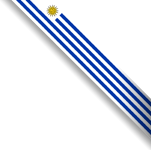Este hermoso fuerte no es tan conocido como debería ser. Ubicado a tan solo 7 kms del Chuy (ciudad fronteriza, Uruguay- Brasil) por la ruta 19 hacia el oeste, fue construido en primer lugar por los españoles (1734) siendo finalizado por los portugueses en 1737.
This beautiful fort is not as well known as it should be. Located just 7 kms from Chuy (border town, Uruguay-Brazil) Route 19 to the ,west was built first by the Spaniards (1734) and it was finished by the Portuguese in 1737.
Esta muy bien conservado y su entorno es realmente espectacular. En mi infancia me gustaba mucho visitar este lugar (a veces con la familia y otras veces también sola!) porque da la sensación de que el tiempo está detenido, rodeado de sierras y vegetación puramente uruguayas, poca gente, el sonido y aromas del campo uruguayo es un verdadero placer. Al visitarlo nuevamente en estos días puedo constatar que nada ha cambiado. El lugar sigue tan bonito y tranquilo como siempre.
It is very well maintained and its setting is truly spectacular. In my childhood I liked visiting this place (sometimes with friends and sometimes alone too!) Because it gives the feeling that time is stopped, surrounded by mountains and purely Uruguayan vegetation, very less people, the sound and smells of the Uruguayan countryside is a real pleasure. When I visited it few days ago I could see that nothing has changed. The place is so nice and quiet as ever.
Detrás de su puente levadizo nos encontramos con una valiosa colección histórica y se reproducen los ambientes donde vivieron sus ocupantes españoles y portugueses. Alrededor se halla un cementerio histórico, un parque y el museo donde se exhibe una diligencia de 1816, una carreta de 1880, infinidad de objetos indígenas, un típico rancho de barro y paja y la reproducción de una pulpería de la época entre otras cosas.
Behind a drawbridge we find a valuable historical collection and the environments where the Spanish and Portuguese occupants lived. Around it we can visit a historic cemetery, a park and the museum where we can see a stagecoach from 1816, a cart from 1880, lot of indigenous objects, a typical ranch of mud and straw and pulpería (ancient grocery store) among other things exhibited.
Al estar tan cerca del Chuy es fácil llegar en bus (aunque la frecuencia no es mucha) Taxi (¡tomarlo del lado uruguayo!) moto o bicicleta. Abre sólo de tarde pero los alrededores se pueden visitar a cualquier hora.
Being so close to Chuy is easy to reach by bus (though they are not very often) Taxi (take it at the Uruguayan side!) Motorcycle or bicycle. Open only in the afternoon but the surroundings you can visit any time.
This beautiful fort is not as well known as it should be. Located just 7 kms from Chuy (border town, Uruguay-Brazil) Route 19 to the ,west was built first by the Spaniards (1734) and it was finished by the Portuguese in 1737.
Esta muy bien conservado y su entorno es realmente espectacular. En mi infancia me gustaba mucho visitar este lugar (a veces con la familia y otras veces también sola!) porque da la sensación de que el tiempo está detenido, rodeado de sierras y vegetación puramente uruguayas, poca gente, el sonido y aromas del campo uruguayo es un verdadero placer. Al visitarlo nuevamente en estos días puedo constatar que nada ha cambiado. El lugar sigue tan bonito y tranquilo como siempre.
It is very well maintained and its setting is truly spectacular. In my childhood I liked visiting this place (sometimes with friends and sometimes alone too!) Because it gives the feeling that time is stopped, surrounded by mountains and purely Uruguayan vegetation, very less people, the sound and smells of the Uruguayan countryside is a real pleasure. When I visited it few days ago I could see that nothing has changed. The place is so nice and quiet as ever.
Detrás de su puente levadizo nos encontramos con una valiosa colección histórica y se reproducen los ambientes donde vivieron sus ocupantes españoles y portugueses. Alrededor se halla un cementerio histórico, un parque y el museo donde se exhibe una diligencia de 1816, una carreta de 1880, infinidad de objetos indígenas, un típico rancho de barro y paja y la reproducción de una pulpería de la época entre otras cosas.
Behind a drawbridge we find a valuable historical collection and the environments where the Spanish and Portuguese occupants lived. Around it we can visit a historic cemetery, a park and the museum where we can see a stagecoach from 1816, a cart from 1880, lot of indigenous objects, a typical ranch of mud and straw and pulpería (ancient grocery store) among other things exhibited.
Al estar tan cerca del Chuy es fácil llegar en bus (aunque la frecuencia no es mucha) Taxi (¡tomarlo del lado uruguayo!) moto o bicicleta. Abre sólo de tarde pero los alrededores se pueden visitar a cualquier hora.
Being so close to Chuy is easy to reach by bus (though they are not very often) Taxi (take it at the Uruguayan side!) Motorcycle or bicycle. Open only in the afternoon but the surroundings you can visit any time.







¡Gracias por el viaje virtual!
ResponderEliminarja ja gracias amigo por el comentario :)
EliminarHola¡
ResponderEliminarPermiteme presentarme soy Karina administradora de una web de turismo, visité tu site y está genial, me encantaría contar con tu sitio web en
mi blog y así mis visitas puedan visitarlo tambien, te puedo agregar como un enlace o un artículo con enlace hacia tu site.
Si estas de acuerdo no dudes en escribirme
Exitos con tu sitio web.
karivelezs@gmail.com
Nice to know that there is a old and beautiful fort near Chuy. I think this is an important monument of that time.
ResponderEliminar